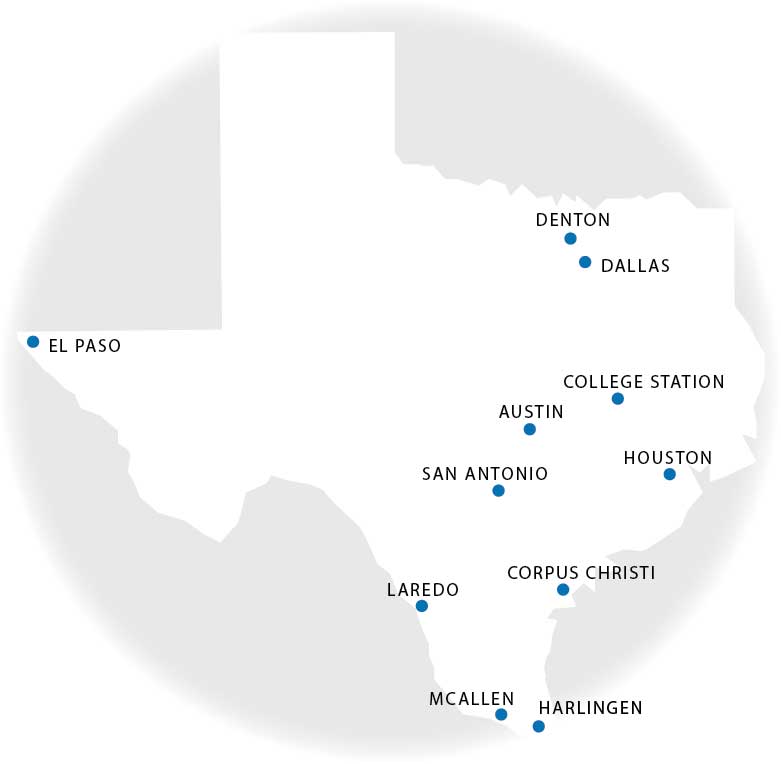TEXAS CYBERSECURITYEducational Programs Economic Snapshot
In 2017, Texas ranked third among states in its number of cybercrime victims and, at $115.7 million, second in financial losses.
Cybercrime — the use of computer technology or the internet to gain unauthorized access to information for exploitative or malicious purposes — poses a danger to both national and personal security.
Cybersecurity
industry
employment
in Texas
130,000
Gross
State
Product
$35.5 billion
Sources: Texas Comptroller of Public Accounts, JobsEQ
Unemployment
Growth Rates for information Security Analyst Employment in Texas, 2018
| Type of Employer | 2018 Employment | Five-Year History | 10-Year Forecast | ||||
|---|---|---|---|---|---|---|---|
| Change | Percent Change | Total Demand | Separations* | Growth | Growth Rate | ||
| Private | 8,579 | 1,316 | 18.1% | 10,493 | 6,808 | 3,685 | 43.0% |
| Government | 451 | 22 | 5.2% | 394 | 322 | 72 | 16.1% |
| Total Covered Employment | 9,029 | 1,338 | 17.4% | 10,888 | 7,130 | 3,757 | 41.6% |
41.6%
Projected Growth Rate
Cybersecurity has a near-zero unemployment rate and an average annual wage of $110,000 across its various occupations.
During the past five years, the state added 1,338 jobs in this occupation and is expected to add 3,757 more during the next 10 years, for a growth rate of 41.6 percent.
Source: JobsEQ
Programs and Awards
The Comptroller’s office has examined educational and employment statistics for the information security analyst occupation, defined by the federal Standard Occupational Classification system as workers who plan, implement, upgrade or monitor security measures for the protection of computer networks and information. These workers ensure appropriate security controls are in place and respond to computer security breaches and viruses.
Information Security Analyst Program Awards in Texas
Certificates/2-Year Awards
4-Year Awards
Postgraduate Awards
| Title | CIP Code* | Certificates and Two-Year Awards | Four-Year Awards | Postgraduate Awards | Total Awards |
|---|---|---|---|---|---|
| Computer and Information Systems Security/Information Assurance | 11.1003 | 285 | 105 | 94 | 484 |
| Computer Science | 11.0701 | 192 | 694 | 529 | 1,415 |
| Computer Systems Networking and Telecommunications | 11.0901 | 840 | 26 | 0 | 866 |
| Information Technology | 11.0103 | 110 | 220 | 0 | 330 |
| Information Technology Project Management | 11.1005 | 0 | 1 | 12 | 13 |
| Network and System Administration/Administrator | 11.1001 | 157 | 1 | 0 | 158 |
| System, Networking, and LAN/WAN Management/Manager | 11.1002 | 285 | 76 | 0 | 361 |
| Total | 1,869 | 1,123 | 635 | 3,627 |
Source: JobsEQ
National Security Agency Designated Centers for Academic Excellence in Texas
- El Paso Community College
- Houston Community College
- Laredo College
- Our Lady of the Lake University (San Antonio)
- San Antonio College
- South Texas College (McAllen)
- Southern Methodist University (Dallas)
- St. Philip’s College (San Antonio)
- Texas A&M University - Corpus Christi
- Texas A&M University - San Antonio
- Texas A&M University (College Station)
- Texas State Technical College Harlingen
- The University of Texas at Austin
- The University of Texas at Dallas
- The University of Texas at El Paso
- The University of Texas at San Antonio
- University of Dallas
- University of Houston
- University of North Texas (Denton)

Estimated Annual
Impact
of Cybersecurity Industry per job
Every job added to the cybersecurity industry generates about $224,000 in economic output and $124,000 in compensation directly within the industry.
Indirect and Induced
Direct
| Impact From | Direct | Indirect and Induced | Total Impact |
|---|---|---|---|
| Employment | 1 | 1 | 2 |
| Sales/Output | $224,000 | $187,000 | $411,000 |
| Compensation | $124,000 | $62,000 | $186,000 |
Sources: JobsEQ
Conclusion
Millions of businesses and individuals face financial and personal risk from compromised systems every day. Unfortunately, cybercriminals see Texas’ large, ever-growing population simply as a large and ever-growing pool of potential targets. The state’s colleges and universities have continued to develop nationally recognized programs that produce the highly skilled professionals needed to address these challenges while creating high-wage, high-demand jobs for Texans. During the 2017 academic year, these programs awarded more than 484 degrees for information security analysts as well as thousands of degrees for workers in other IT occupations.
Texas’ cybersecurity educational programs train workers who enter almost every industry of the state economy. But they also contribute greatly to the cybersecurity industry itself — an industry so new it has yet to be defined by NAICS.
Questions?
If you have any questions or concerns regarding the material on this page, please contact the Comptroller’s Data Analysis and Transparency Division.
